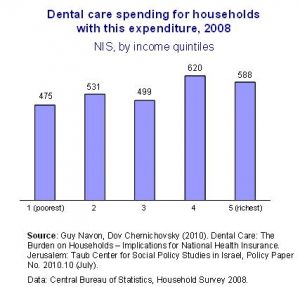Israelis have had national healthcare coverage since 1995. Even before then, access to basic medical care was almost universal and insurance covered a large portion of the population. This legacy of wide accessibility to basic medical services for the whole population has contributed to comparatively high levels of health in Israel.
Dental care has been an exception. Access to it has remained a matter of household ability to pay. As a result, even basic dental treatments, including preventive care, are often beyond the reach of families with limited means. And, indeed, contrary to general health levels, dental health in Israel is inferior to that in other developed countries.
Prof. Dov Chernichovsky, Chair of the Taub Center’s Health Policy Program and a professor at Ben-Gurion University, and Dr. Guy Navon, from the Bank of Israel and a Policy Fellow in the Program, recently published a paper focusing on Israel’s dental health situation (Dental Care: The Burden on Households – Implications for National Health Insurance, Taub Center Policy Paper No. 2010.10) using survey data from the Central Bureau of Statistics. They found that with no public dental insurance, and with even private insurance options limited for the average resident, spending on dental care has become a central medical expenditure item for Israeli households. Dental care for most elderly is often quite prohibitive financially.
The first figure shows the amount spent in 2008 on dental care for families who reported such expenditures. The amounts are remarkably similar across the income spectrum. Spending by the richest households is less than 25 percent greater than that of the poorest households, even though the former’s income level is about five times as high. This strongly suggests that levels of dental expenditures are made according to need and are clearly regressive.
This does not mean that poor families are not compelled to curb their spending on dental care. The second figure shows the percentage of families reporting that they had expenditures on dental care during the year; the percentage for poorer families is smaller, suggesting that they often simply do without.
The skimping on dental care evident in the lower quintiles has a disproportionate impact on children, insofar as children up to the age of 18 constitute 50 percent of the members of the poorest households but only 20 percent among the wealthiest households.
On the basis of their findings, Navon and Chernichovsky propose that Israel should include dental care in universal healthcare entitlement for at least the population up to age 18 and for the needy elderly. Their research leads them to conclude that this would increase the performance of the Israeli healthcare system, would not increase costs, and would enhance both social and economic equity.




